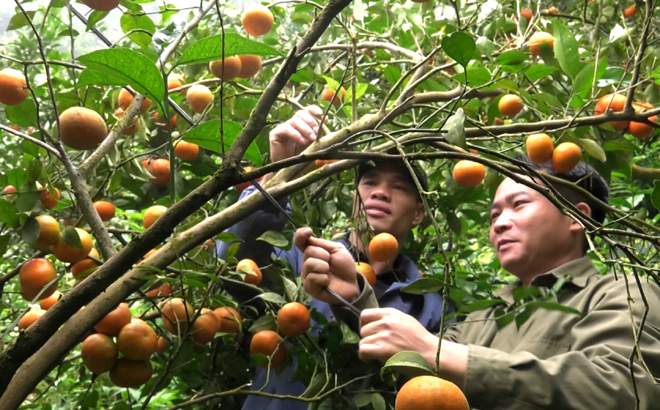Mindset change in Yen Bai’s agricultural development
- Friday, October 14, 2022
The transition of mindset from “agricultural production “ to “agricultural economy” in adaptation to climate change and market trends will lay an important foundation for Yen Bai province to gear toward an ecological agriculture, modern rural areas and civilised farmers.

|
|
Planting organic orange trees brings high income to members of Binh Thuan orange cooperative in Van Chan district.
|
The province issued a resolution on the development of agriculture in the direction of improving quality, efficiency and added value in combination with new rural development for the 2021 - 2025 period. Building on comparative advantages and diversity of ecological areas, Yen Bai has developed key products; specialties, organic and One Commune, One Product products; boosted production in value chain in combination with processing and consumption, gradually changing its mindset from agricultural production to agricultural economy.
Since 2020, the province has launched 39 production projects in the value chain at a total cost of 152 billion VND, 25.6 billion VND of which was sourced from the State budget. It has set up intensive farming areas with 10 key products and 10 specialty and organic products, built and developed 138 products meeting OCOP standards, including 20 products meeting four-star standards and 117 meeting three-star standards.
By the end of 2021, 36 local specialties and key products were granted with intellectual property protection, eight of them registered for geographical indications, 18 others had certified trademarks and 10 had collective trademarks.
Minister of Agriculture and Rural Development Le Minh Hoan (second from left) and local leaders visit a rose farm of Nam Khat rose cooperative in Mu Cang Chai district.
Yen Bai also holds huge potential for developing forestry and wood processing with a total forest area of 532,000ha, accounting for 63% of the province's natural area, ranking fourth nationwide. The average output of timber reaches 900,000 cu.m per year.
The province is now home to 4,340 ha of forests meeting Forest Stewardship Council (FSC) standards. Between now and 2025, it strives to have about 90,000-100,000 ha of forests certified as FSC or organic.
Yen Bai issued a number of mechanisms and policies to draw investment, develop industry, handicraft, agro-forestry processing sectors in tandem with tourism development in rural areas such as bamboo shoots, cinnamon oil, silkworm, and others.
It now records over 500 wood processing establishments, two producers of votive papers with an annual capacity of nearly 500,000 tonnes, 13 cinnamon oil factories and 120 processing facilities, more than 60 tea processing plants, two cassava powder and two bamboo shoot processing plants for exports.
The province targeted ensuring solid livelihoods for residents, shifting from small-scale production to key, specialty, organic and OCOP products such as Tu Le glutinous rice, organic Shan Tuyet tea from the communes of Suoi Giang, Nam Muoi, Sung Do in Van Chan district and Phinh Ho commune in Tram Tau district, black chickens and indigenous pigs from the districts of Tram Tau, Mu Cang Chai, Van Chan, Van Yen, Luc Yen; and organic cinnamon from Van Yen, Tran Yen districts, and others.
To such end, the province will promote linkages between farmers in cooperatives and enterprises, and between households and cooperative groups in value chain; change the structure of agriculture toward increasing the proportion of forestry and animal husbandry and switching from the farming of less efficient rice to more economic efficient crops.
It will also step up the application of modern technologies and biotechnology in seed production for intensive afforestation, improve the output and quality of key crops, and attract capable firms to sustainable forestry, and connect businesses with farmers and cooperatives in value chain.
Manh Cuong